2020 山东省泰安市中考英语真题及答案
第 I 卷(共 80 分)
第一部分 听力(共 25 小题;1-20 小题每题 1 分, 21-25 小题每题 2 分, 满分 30 分)
(一)听句子, 选择适当的应答语。每个句子读两遍。
1. A. By bike.
B. Across from the park.
C. You can get there.
2. A. I was cooking.
B. I felt nervous.
C. What a terrible
rainstorm!
3. A. Two weeks ago.
B. For only two weeks.
C. More than 2000 yuan.
4. A. That’s all right.
B. Of course not.
C. OK, I will.
5. A. About 2 kilometers.
B. Ten minutes.
C. On foot.
(二)听五段对话, 选择正确答案。每段对话读两遍, 你将有 20 秒钟的时间阅读下面 5 个
小题。
6. What's Mr. Green's telephone number?
A. 378-5792.
B. 368-5792.
C. 368-5762.
7. Where does the conversation probably take place?
A. In a restaurant.
B. At home.
C. At school.
8. What does Lucy think of getting her ears pierced?
A. She likes it.
B. She doesn’t mind it.
C. She can’t stand it.
9. How much is the dictionary?
A. 15 yuan.
B. 20 yuan.
C. 35 yuan.
10. What can we know from the conversation?
A. The boy failed his math test.
B. The boy wanted to give up.
C. The mother got very angry.
(三)听两段长对话, 选择正确答案。每段对话读两遍。听每段对话前你将有 10 秒钟的时
间阅读对应的 3 个小题。
听第一段对话, 回答第 11 至 13 小题。
11. What did Sally think of the restaurant?
A. The service is bad.
�
B. The food is expensive.
C. The environment is comfortable.
12. When will Sally and Mike go to the restaurant?
A. Next Friday.
B. Next Saturday.
C. Next Sunday.
13. How will they go to the restaurant?
A. By bike.
B. By car.
C. On foot.
听第二段对话, 回答第 14 至 16 小题。
14. What does Alice think of Mark Twain’s novels?
A Boring.
B. Relaxing.
C. Fantastic.
15. Whet docs Alice want to be in the future?
A. A writer.
B. A teacher.
C. A reporter.
16 What will Alice do on Sunday?
A. Do her homework.
B. Write stories.
C. Go to the library.
(四)听短文, 回答下面四个问题, 选择正确答案。短文读两遍。你将有 20 秒钟的时间阅
读下面 4 个小题。
17. Where is Jenny Smith from?
A. Britain.
B. Germany.
C. America,
18. How long will the speech last?
A. Two hours.
B. Three hours.
C. Four hours.
19. What volunteer job did Jenny do when she was in France?
A. A teacher.
B. A zoo keeper.
C. A nurse.
20. What will Jenny talk about in her speech?
A. The experience of writing books.
B. The experience of her visit to France.
C. The experience of working in the library.
(五)听短文, 填表格。根据短文内容, 写出下面表格中所缺信息, 每空一词。短文读三
遍。你将有 20 秒钟的时间阅读表格内容, 答题完毕后, 请将答案填写在答题卡的相应位置。
Italy
▲Don’t put cheese on the top of your pizza.
Table Manners
�
(意大利) ▲Never ask for cheese if it’s not (21)_________________
▲ After you have eaten meat, you ’ d better not ask for ( 22 )
______________
America
▲Arrive on time.
▲Don’t circle your plate with your(23)______________.
▲Don’t say, “I’m(24)____________.” Just put the fork and knife
across the plate.
▲Don’t reach across the table for(25)______________. Ask the nearest
person for help.
第二部分 完形填空(共 10 小题;每小题 1 分, 满分 10 分)
阅读下面短文, 掌握其大意, 然后从每题所给的 A、B、C 三个选项中, 选出能填入短文相
应空白处的最佳选项, 并在答题卡上将该项涂黑。
It was Thanksgiving. Snow was fling when Bob
26
towards the city park.
Bob was deserted(遗弃)by his parents and was raised(抚养)by a kind man. Two
years ago. to be
27
, Bob built a tradition. That was to take his
Thanksgiving dinner to the park to share with a homeless person.
The park was
28
. Everyone was home enjoying their dinner. After arriving
at the park, Bob saw an old woman sitting on a bench(长椅). Bob stopped his car
in a parking place and got out. He took the
29
from the front seat and began
walking towards her. When he stood beside her, she jumped as if(好像)she had
30
been woken up from sleeping. She looked up
31
Bob, and then her eyes
brightened.
“Good evening, madam,” Bob said, smiling.“I’ve brought you some Thanksgiving
dinner. Would you like to share it with me?” The woman nodded and Bob served her
the food and then watched
32
she ate happily. When the woman finished, he
33
the table. Then he took twenty dollars out of his wallet.
He put the
34
into her hand. Then he kissed her lightly on the forehead
and said, “Thank you for
35
my Thanksgiving dinner.” With that, he took his
dishes from the table and returned to the car.
�
(
(
(
(
(
(
(
(
(
(
)26. A. walked
B. drove
C. ran
)27. A. thankful
B. successful
C. surprised
)28. A. noisy
B. crowded
C. empty
)29. A. flowers
B. food
C. books
)30. A. suddenly
B. quietly
C. carefully
)31. A. after
B. to
)32. A. because
B. as
)33. A. cleared
B. broke
C. at
C. since
C. covered
)34. A. dishes
B. money
C. keys
)35. A. bringing
B. cooking
C. sharing
第三部分 阅读理解(共两节;满分 40 分)
第一节 阅读下列短文或图表,从每题所给的 A、B、C、D 四个选项中,选出最佳选项,并
在答题卡上将该项涂黑,(共 15 小题;每小题 2 分,满分 30 分)
A
It is reported that tea has helped the poor
farmers in Yunnan find a way out of poverty(贫
穷) thanks to the efforts of a man named Ren Huai
can.
Ren was suffering mouth ulcers (溃疡) when
he first visited the Jingmai Mountain in Pu'er City in the spring of 2006. However,
after picking off several leaves from the old tea trees and chewing (咀嚼) them,
he found the pain was gone the next morning. He felt very amazed. Ren began to show
great interest in the tea from Yunnan. He found that the local tea business was
very scattered (分散的)。 He also realized that the local tea farmers were very
poor because of the underdeveloped tea market. So he made up his mind to develop
the tea industry in order to help the local people get out of poverty.
In September 2006, Ren set up a tea company. He hired(雇佣) poor farmers
from neighboring areas to pick tea leaves. Professional technicians(技师) were
invited to teach the farmers how to do their jobs scientifically. The company taught
�
them how to manage their trees and produce the best tea. As a result, their tea
quality has greatly improved, and the price has gone up. In this way, the tea company
has helped many people get out of poverty.
36. After chewing the tea leaves, Ren was__________ to find the pain was gone the
next morning. (
)
A. sad
B. amazed
C. worried
D. terrible
37. Why were the local tea farmers very poor before? (
)
A. Because many of their tea trees died.
B. Because the tea farmers were lazy.
C. Because the tea market was underdeveloped.
D. Because they had no interest in planting tea trees.
38. What is the third paragraph mainly about? (
)
A. How the farmers picked tea leaves.
B. How Ren helped develop the local tea industry.
C. Why Ren wanted to help the farmers.
D. What Ren did for the professional technicians.
39. What can we learn from the passage? (
)
A. The tea farmers haven’t got out of poverty.
B. Ren wanted to make more money for himself in Yunnan.
C. The local tea market was developed before the year of 2006.
D. Ren and his company have helped the poor farmers in Yunnan.
B
The Digital Media Summer Camp
�
The digital media(数字媒体)summer camp is a great chance for students aged
7 to 18 to have STEM courses. Students can learn to build an app, program a robot,
or explore(探索)the world of music production. STEM courses will also help students
create, learn teamwork and solve problems.
Students will learn from our teachers who have been employed(聘用)for both
their teaching experience and rich knowledge in their fields. Besides making new
friends, students will leave with amazing final projects and lasting memories.
Time: August 1st--August 31st
Daily Schedule:
8: 30 a. m. ~ 10: 00 a. m.
Hands on STEM Instruction
10: 30 a. m. ~ 12: 00 p. m.
Continued Instruction & Creation
12: 00 p. m. ~ 1: 30 p. m.
Lunch Break
1: 30 p. m. ~ 3: 00 p. m.
Robots Programming
3: 30 p. m. ~ 4: 30 p. m.
Music Appreciation(鉴赏)
Saturday Open House:
At 3: 30 p. m. every Saturday, parents are invited to our Open House. Students
can show the projects they have been working on. Their parents can meet the teachers
and explore more chances for their children to continue learning and creating.
40 The digital media summer camp can help students___________. (
)
A. keep healthy
B. learn a foreign language
C. improve their witting ability
D. develop STEM knowledge
41. Which word can best describe the teachers of the summer camp? (
)
A. Experienced.
B. Humorous.
C. Young.
D. Strict.
42 Which of the following statements is NOT true? (
)
A. Parents can be invited to see their kids' projects.
B Students will leave the camp with amazing final projects.
C. Students’ lunch break lasts two hours.
D. Students’ can learn to program a robot in the summer camp.
C
�
If you walk along the River Thames, there are lots of interesting buildings
to see. Running through the heart of London, there are also many galleries, markets,
shops and activities to keep you busy along its banks. You will also see a strange
round building. It looks very old and very different form all the others, This is
Shakespeare's Globe Theatre(莎士比亚环球剧场).
The Globe Theatre was first built here in 1599. William Shakespeare was one
of the most famous writers that ever lived. His plays were performed in the theatre
for many years. However, in 1613, a fire broke out during a performance. The theatre
was destroyed(毁坏). but the second was built the following year. It remained
a theatre until 1644, and then it was pulled down to build houses. The modern(and
also the third)Globe Theatre was completed in 1997, over 350 years later. This
was done to honor Shakespeare, the most famous English writer. To this day, his
many plays are performed there daily. He wrote around thirty-eight plays. They are
comedies(funny stories), histories(about historical events and people), and
tragedies(serious and sad stories). People come from all over the world to watch
them at the Globe Theatre. They are performed in exactly the same way as they were
hundreds of years, ago.
The building is round and made mostly of wood. There are simple seats on three
different levels all around the sides. Everyone can see the stage(舞台). However,
there is no roof(屋顶)in the middle! The cheapest tickets are standing tickets.
You stand in the middle, right in front of the actors, but if it rains, you will
get wet!
43. When was the second Globe Theatre built? (
)
A. In 1599.
B. In 1613.
C. In 1614.
D. In 1997.
44. What can we know about Shakespeare according to the second paragraph? (
)
A. Shakespeare was one of the most famous French writers.
B. Many of his plays are performed daily in the modern Globe Theatre.
C. His plays are performed in a different way from they were hundreds of years ago.
D. He wrote thirty-eight plays that were all about historical events and people.
�
45. What does the last paragraph mainly tell us? (
)
A. The inside structure(结构)of Shakespeare's Globe Theatre.
B. The history of Shakespeare's Globe Theatre.
C. The opening time of Shakespeare's Globe Theatre.
D. The three types of tickets that you can choose.
46. Which of the following statements about the modern Globe Theatre is TRUE? (
)
A. It has remained there for over 350 years.
B. The round building looks old and strange.
C. It is made mostly of wood and has a round roof in the middle.
D. If we buy the cheapest tickets in the theatre, we will be farthest from the stage.
D
To many people, art is a human expression of
creativity. But in recent years, you may have read news
about artificial intelligence(AI)creating its own art,
such as painting or writing poems. Some people worry that
AI might someday replace(替代)artists.
But this worry seems to be unnecessary, at least for now. Many artists today
are turning AI into a useful tool. Instead of replacing artists, AI is bringing
artists more possibilities.
A piece of music created by AI recently attracted attention. AI was used to
create the music based on the protein(蛋白质)structure of COVID-19. The music
lasted nearly two hours. The project was led by Markus Buehler, an American musician
and MIT professor(教授)of engineering. He assigned (指定) a unique note (独特
的音符) to each amino acid (氨基酸) is the protein. The AI then translated these
notes into music.
Listeners found the project “mind-blowing”. “It allows me to see the virus
in a new way,”said one listener. This surprising combination (结合) between science
and art could not be achieved without AI. As The Verge wrote, “AI helps artists
play around in unpredictable ways, creating things beyond (超过) what they have
�
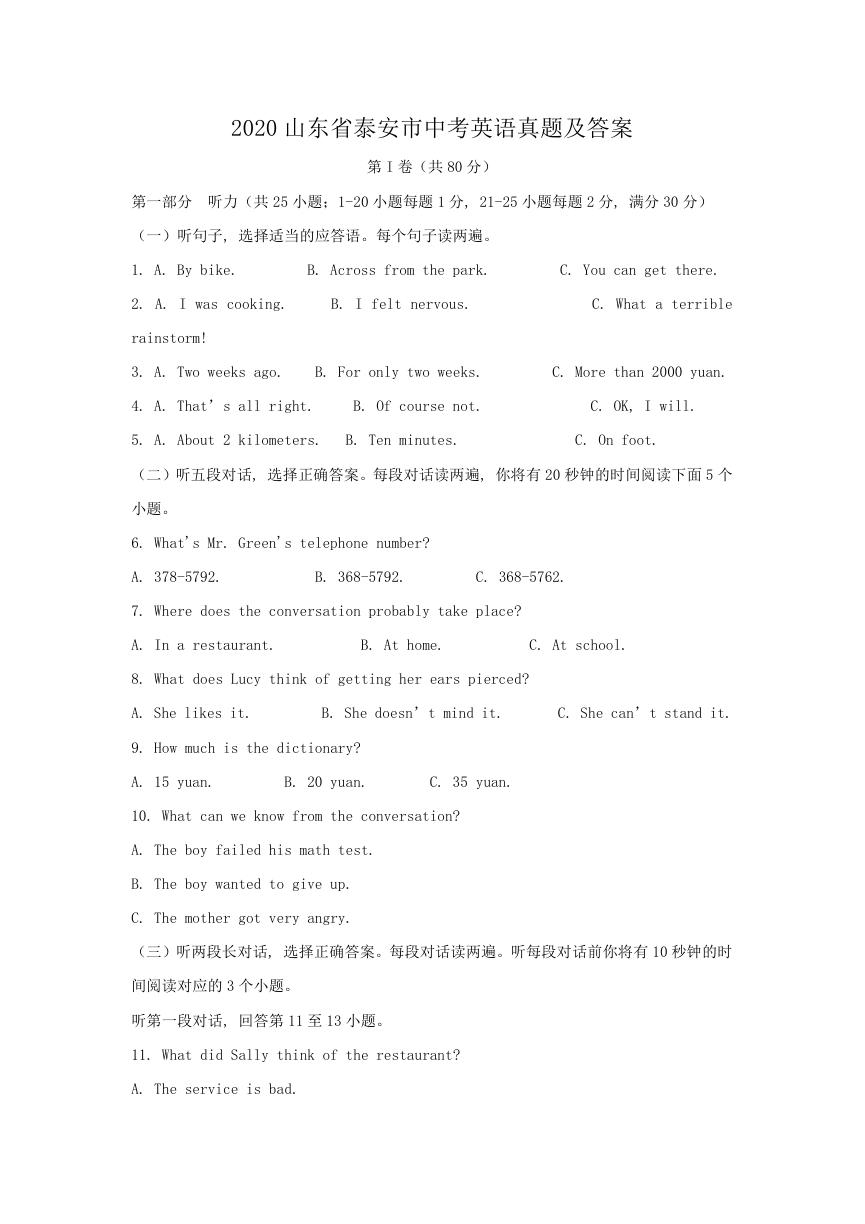
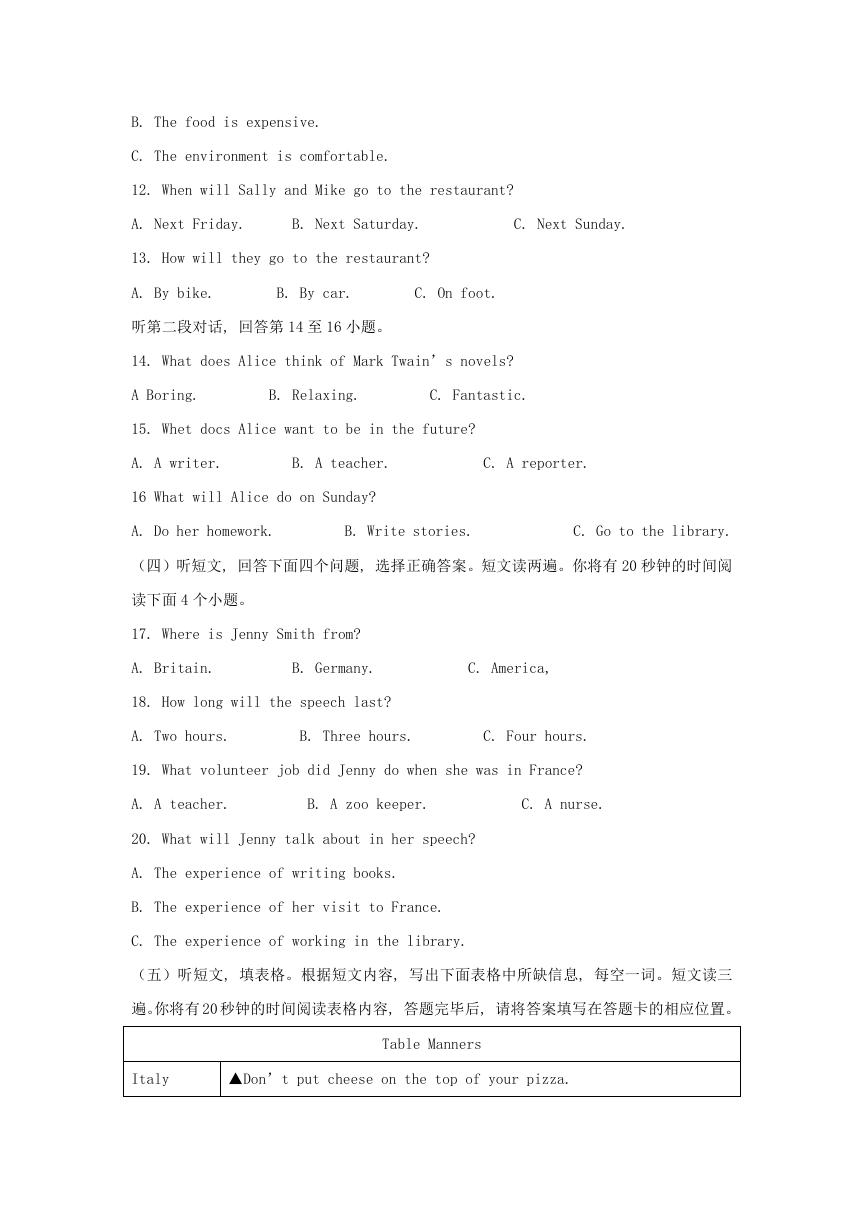
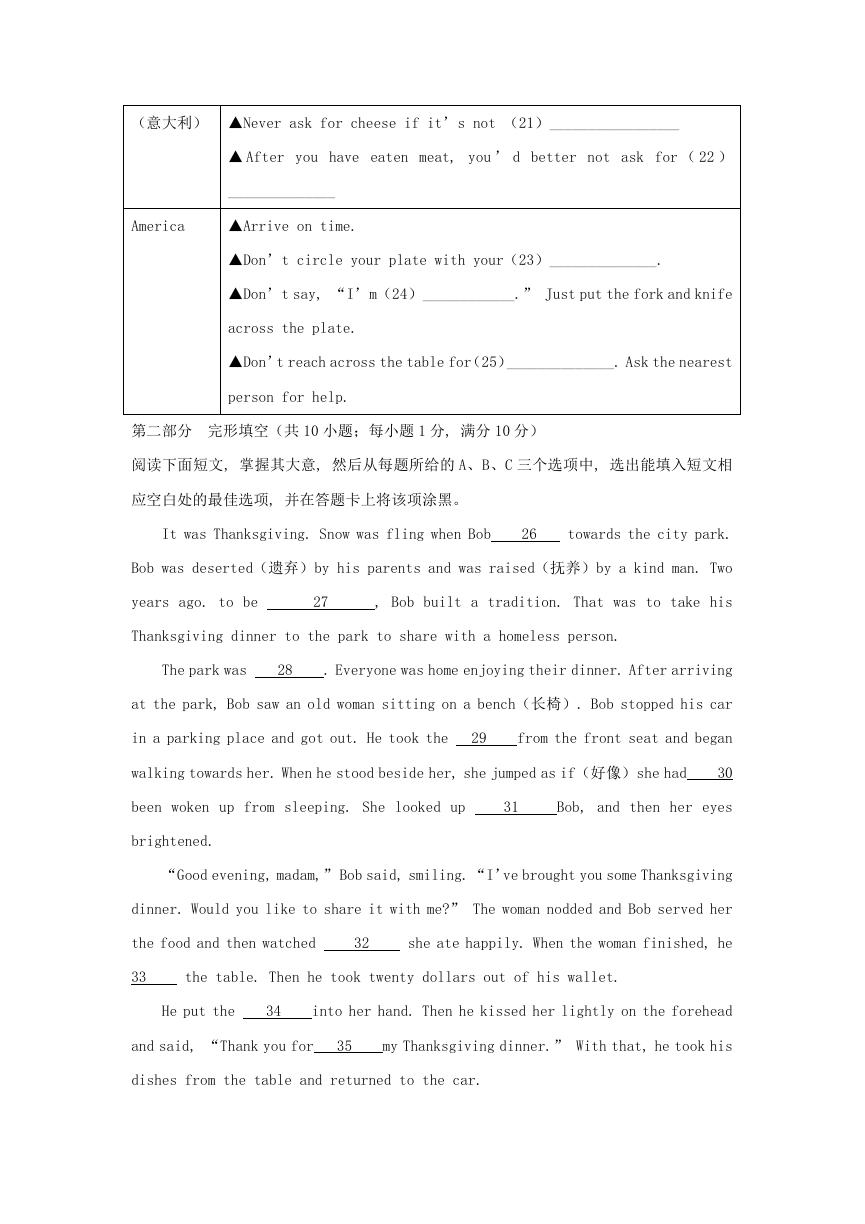
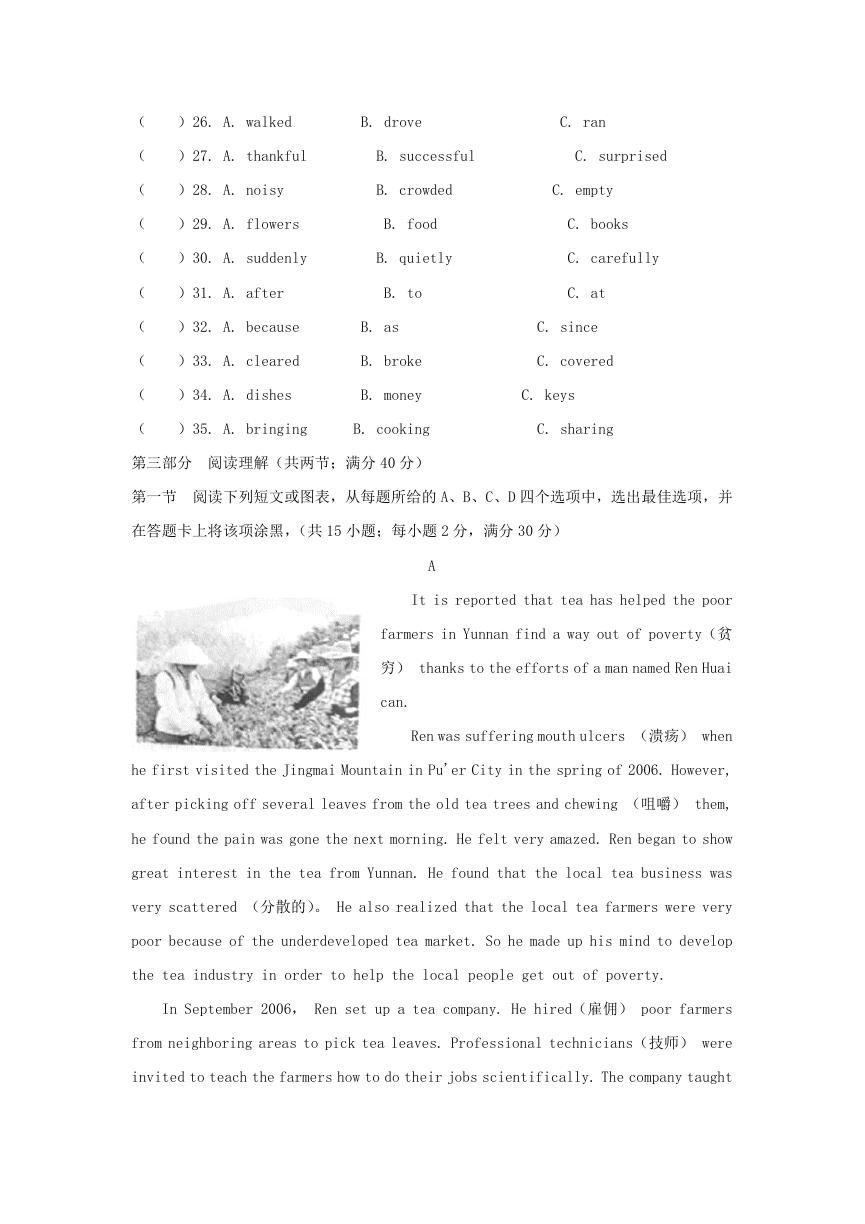
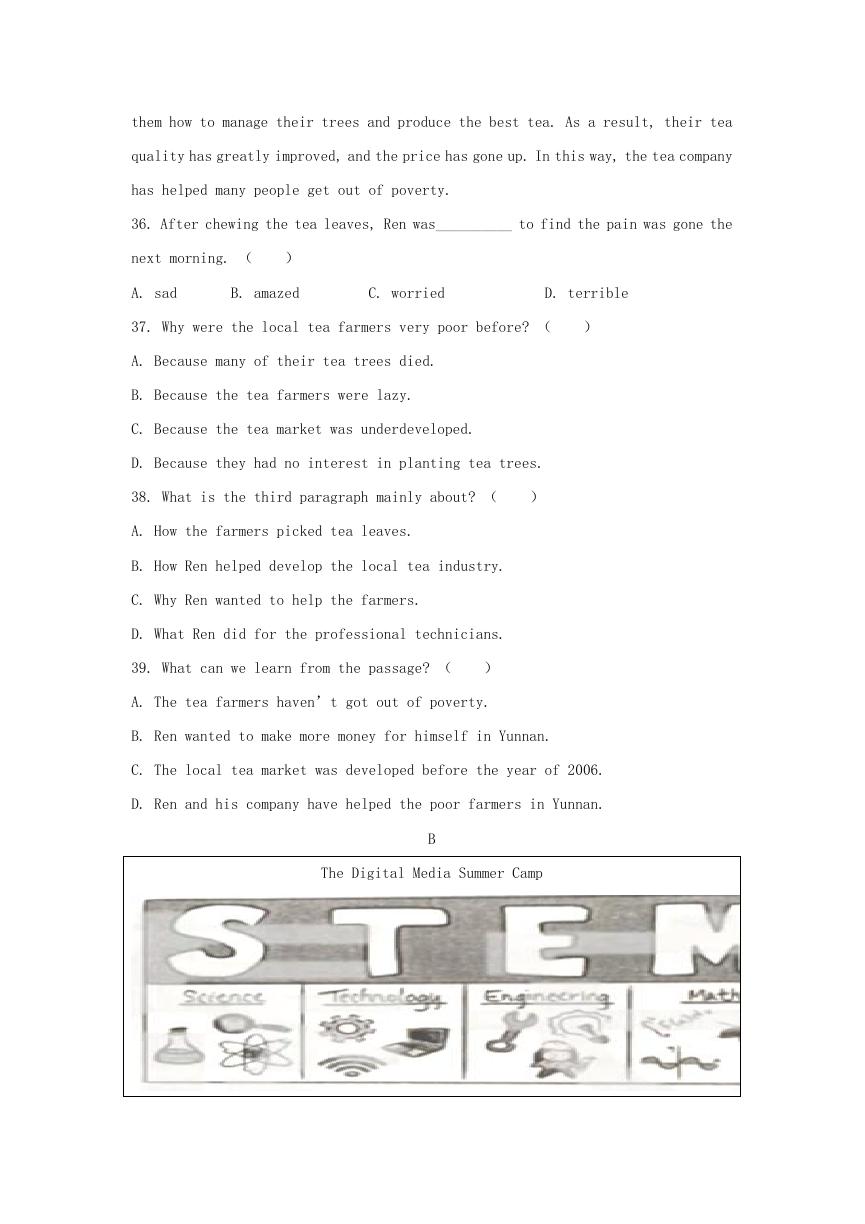
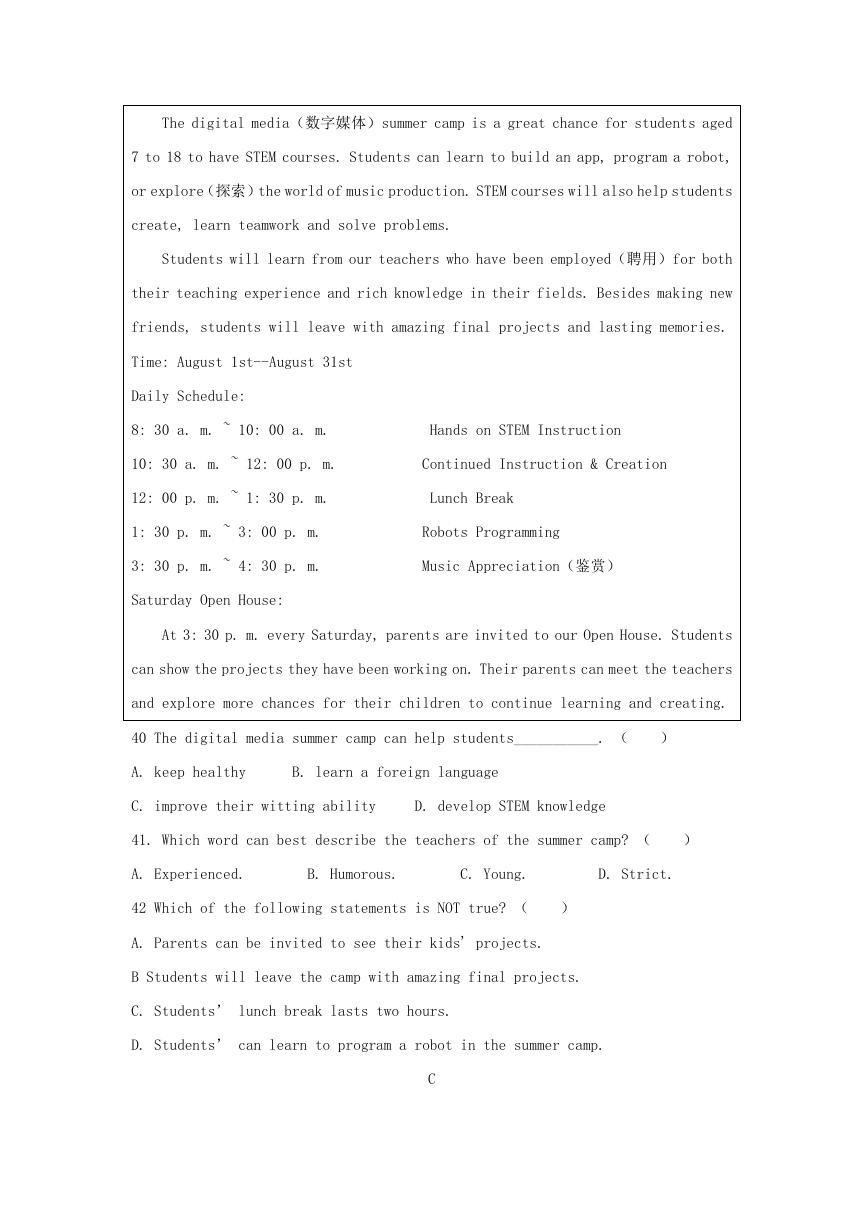
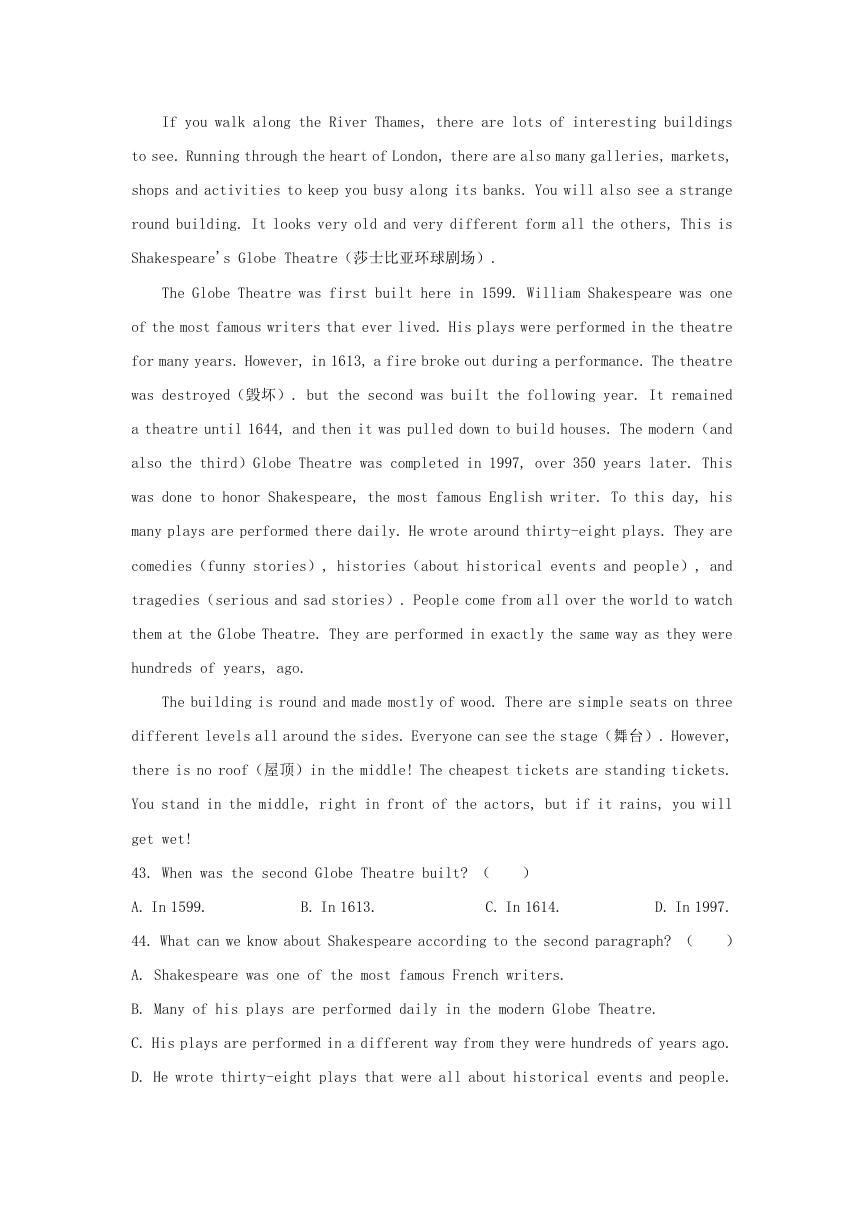
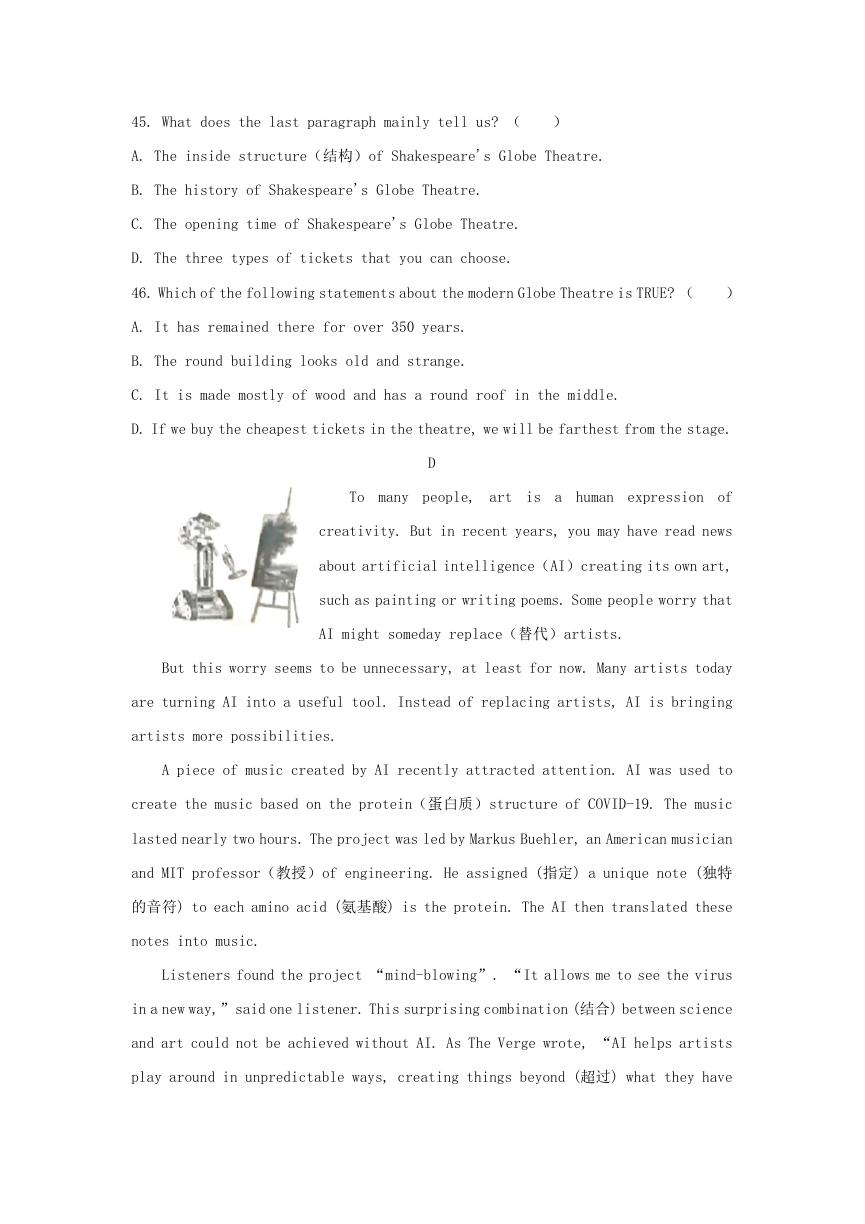








 2023年江西萍乡中考道德与法治真题及答案.doc
2023年江西萍乡中考道德与法治真题及答案.doc 2012年重庆南川中考生物真题及答案.doc
2012年重庆南川中考生物真题及答案.doc 2013年江西师范大学地理学综合及文艺理论基础考研真题.doc
2013年江西师范大学地理学综合及文艺理论基础考研真题.doc 2020年四川甘孜小升初语文真题及答案I卷.doc
2020年四川甘孜小升初语文真题及答案I卷.doc 2020年注册岩土工程师专业基础考试真题及答案.doc
2020年注册岩土工程师专业基础考试真题及答案.doc 2023-2024学年福建省厦门市九年级上学期数学月考试题及答案.doc
2023-2024学年福建省厦门市九年级上学期数学月考试题及答案.doc 2021-2022学年辽宁省沈阳市大东区九年级上学期语文期末试题及答案.doc
2021-2022学年辽宁省沈阳市大东区九年级上学期语文期末试题及答案.doc 2022-2023学年北京东城区初三第一学期物理期末试卷及答案.doc
2022-2023学年北京东城区初三第一学期物理期末试卷及答案.doc 2018上半年江西教师资格初中地理学科知识与教学能力真题及答案.doc
2018上半年江西教师资格初中地理学科知识与教学能力真题及答案.doc 2012年河北国家公务员申论考试真题及答案-省级.doc
2012年河北国家公务员申论考试真题及答案-省级.doc 2020-2021学年江苏省扬州市江都区邵樊片九年级上学期数学第一次质量检测试题及答案.doc
2020-2021学年江苏省扬州市江都区邵樊片九年级上学期数学第一次质量检测试题及答案.doc 2022下半年黑龙江教师资格证中学综合素质真题及答案.doc
2022下半年黑龙江教师资格证中学综合素质真题及答案.doc